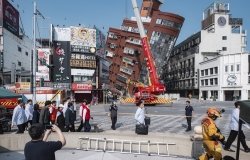U.S. Strategy in the Asia-Pacific Region
Kurt Campbell, vice president, Center for Strategic and International Studies; Ralph Cossa, president, Pacific Forum/CSIS; Richard Cronin, specialist in Asian affairs, Congressional Research Service; Aaron Friedberg, director, Center of International Studies, Princeton University; Harry Harding, dean, Elliott School of International Affairs; Major General David H. Huntoon, Director of Strategy, Plans and Policy, U.S. Army; Karl D. Jackson, director, Asia Studies and South East Asia Studies, School for Advanced International Studies; Kenneth Lieberthal, professor, University of Michigan; Michael McDevitt, director, Center for Strategic Studies, CNA Corporation; Marvin C. Ott, professor, National War College; Thomas R. Pickering, senior vice president, The Boeing Company; J. Stapleton Roy, managing director, Kissinger Associates, Inc; Walter B. Slocombe, Caplin and Drysdale; William M. Wise, president, The Sorrento Group.
Overview
The Asia Program sponsored a conference on May 5, 2003, designed to promote discussion on an appropriate U.S. strategy for the Asia-Pacific region for the next 8 - 10 years. An invitation-only event attended by senior military officials and leading policy practitioners and academic experts on Asia, this program was part of the Dwight D. Eisenhower National Security Series, organized by the U.S. Army to encourage mid-level and senior leaders to think more systematically about future national security issues.
In a broad-ranging, full-day discussion, conference attendees sought to stimulate more precise analysis and discussion on broad strategic questions such as:
How will fundamental American interests in the Asia-Pacific region change in the next 5-10 years?
How and to what extent will new threats such as terrorism and the proliferation of weapons of mass destruction modify traditional American security concerns?
Does the Bush administration’s doctrine of preemption provide an appropriate and effective foundation for dealing with threats to U.S. security in Asia?
What should be the role of permanent alliances in America’s Asia strategy?
How can U.S. strategy accommodate China’s growing power in a manner that adequately safeguards American interests?
What changes should the United States consider in the deployment of military forces in the region, including overall troop levels and types of forces, command arrangements, and number and locations of permanent military installations?
Definitive answers to these questions were neither reached nor sought. Nonetheless, a few themes periodically surfaced throughout the day and suggested possible starting points for addressing the question of U.S. strategy in the region over the coming decade. One recurring theme revolved around the unprecedented degree to which American power today overshadows that of any potential rival or coalition of rivals. J. Stapleton Roy, who served as U.S. ambassador in China, Indonesia, and Singapore, observed that both American political and constitutional theory and a close reading of history warn that unchecked power of this magnitude is in continual danger of being abused. Other participants, however, argued that American might gives the United States the opportunity to play the role of benign cop on the beat, keeping law and order in Asia.
Consideration of the potential uses of American power led to a broader discussion of whether the United States was a status quo country, or a crusading, ideologically-driven power. In an analysis that would probably surprise many Americans, one participant described the United States as a revisionist, even a revolutionary, actor in the international arena. The other major countries of East Asia, he claimed, are all status quo powers, so many of them view Washington with apprehension. This led to discussion of the need for American leaders to articulate U.S. policy and intentions more clearly, and to take care lest American actions, inadvertent as well as deliberate, encourage Asians to fashion a strategy to counter Washington’s predominant power.
America’s fundamental interests in Asia are unlikely to change dramatically over the next ten years, most judged. Here consensus evaporated, however, as participants failed to agree whether those interests could best be safeguarded by maintenance of traditional alliances, by shifting “coalitions of the willing,” by a balance of power with the United States in the role of balancer, by an old-fashioned concert of power, by multilateral institutions of either a regional or a global character, or by benign neglect.
Drafted by Robert M. Hathaway
Asia Program (202) 691-4012
Hosted By

Indo-Pacific Program
The Indo-Pacific Program promotes policy debate and intellectual discussions on US interests in the Asia-Pacific as well as political, economic, security, and social issues relating to the world’s most populous and economically dynamic region. Read more
Thank you for your interest in this event. Please send any feedback or questions to our Events staff.










